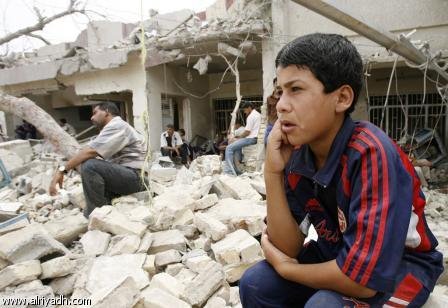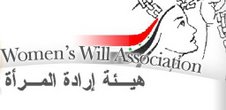Gloom, despair on display at Iraqi women's prison
POSTED: 9:11 a.m. EDT, May 11, 2007
• Women in prison press against cell bars, desperate to be heard
• Most women say they've been held at length with no trial
• U.N. report says Iraq's courts have "failed to meet minimum fair trial standards"
• Inmate: "We just want to be referred to trial"
By Arwa DamonCNN
Editor's note: In our Behind the Scenes series, CNN correspondents share their experiences in covering news and analyze the stories behind the events. Here, CNN's Arwa Damon describes an exclusive visit to Iraq's main prison for women.
BAGHDAD, Iraq (CNN) -- The first sound you hear as your walk into the main women's prison in Iraq is a low murmur, the voices of the 162 women behind bars, all talking to one another. You can also hear the faint cries and laughter of children -- 16 of them in fact, all under the age of 4.
The prison has an almost surreal feel. The first floor is well-lit, filled with official offices and a medical room for the inmates. Pasted on the walls are drawings of women and children. In almost each picture, there's one or two teardrops on their faces.
The drawings are the work of a woman serving time for forgery. Asked which one is her favorite, she immediately points to a drawing that shows an older, brown-haired woman hugging a younger girl.
That's because the drawing is her lasting memory of tightly holding her 16-year-old daughter at the end of their last meeting. Her daughter was killed by insurgents shortly after she left the facility.
As you move from the first floor, an overwhelming sense of gloom closes in. It hangs thick in the air. The paint on the dark-colored walls is peeling; the metal bars, rusty. When you get to the cells, the women press themselves against the bars, desperate to tell their stories. (Watch mothers behind bars hold babies, plea for help )
About 25 women are in each 20-by-40-foot cell. And as somber as the prison is, the cells have an interesting mix of bright colors. The blankets on the beds are like rainbows, and the walls are yellow. The women wear bright blue outfits with black head scarves; some wear more colorful headpieces.
Then, they tell their stories.
A grandmother showed us her 8-month-old granddaughter. The infant was brought to the facility when she was just 10 days old -- her family slain, her mother hanged from a lamppost.
"This child is an orphan," the woman said. "I have been here for a year. I have no one. I have no lawyer, no money."
She is serving a seven-year sentence for stealing; a court-appointed attorney represented her at trial.
Another child is 6-month-old Mariam, who was born in a prison cell, crammed with 24 women and at least two other children. The child's mother told me she has been at the al-Kadhimiyya Women's Prison for 18 months, waiting for a trial on murder charges. She says that she doesn't even have legal representation and that she's innocent.
She says a vehicle she was in was stopped by gunmen, and all the men inside were killed. When police arrived, she was standing next to the shot-up car and was arrested for murder, she said.
Report: Torture, unfair trials not uncommon
Everywhere we went, we heard the same complaints -- no legal representation, unfair trials -- views also expressed in a recent United Nations report that concluded Iraq's court system "consistently failed to meet minimum fair trial standards." (Watch a woman's plea for help from death row )
More than 37,000 people, mostly men, are detained or imprisoned in the Iraqi criminal system, according to the most recent report on human rights conditions by the U.N.'s Assistance Mission for Iraq.
The report, issued last month, found that torture of suspects is not uncommon, that courts don't meet fair trial standards and that the government is not fully investigating allegations of abuse. It also found that nearly 17,000 people in custody have been held "effectively without charge or trial."
Accountability in Iraq is hard to come by.
Iraq's Ministry of Justice admits the system is suffering, incapable of handling Iraq's ever-growing number of detainees. Iraqi Vice President Tariq al-Hashimi was less diplomatic. He had harsh words about his country's judicial system.
"Unreliable and lost much of its integrity. And to some extent, it's corrupted," he said.
Inmate: We just want 'to know our fate'
The prison is an example of the harsh realities on the ground here.
One woman said she stands wrongly accused of killing her father. She said her brother carried out the killing and that she reported it to police. She was held at a police station as a witness, she said, but then brought to the women's prison as a detainee. That was four months ago, and she says she just wants a hearing.
Others were more desperate. "I have 11 children. I don't know where they are," one woman said as she displayed passport-sized photos of her loved ones. "We just want to be referred to trial to know our fate, if we have to serve a sentence or not."
The prison warden would not disclose how many of the women are still awaiting trial, but the Organization of Women's Freedom in Iraq says it is just under half. The group has taken on the overwhelming battle for these women's basic rights.
"Most of the detainees have been waiting for a year and a half to two years to reach a courtroom," said Dalal Rubaie, the organization's head. "What is the role of the court? What is the judge waiting for?"
As we left the facility, we saw one prisoner briefly reunited with her young children -- for just a few minutes a loving embrace amid the days, weeks and months of waiting.





